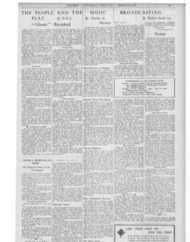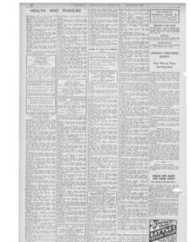Page 15, 24th August 1935
Page 15

Report an error
Noticed an error on this page?If you've noticed an error in this article please click here to report it.
Tags
Share
Related articles
Sports Comments
By Romany
The famous single-wicket match at Canterbury between Marriott and Goddard was staged to help eke out a short third day. It was a grand idea, it pleased the spectators, who were beginning to feel the frustration flowing from the edict "No play guaranteed, no money returned," and its extension would make for better attendances on third days.
In the Canterbury instance the "little game" followed a benefit match which brought something in the region of £1,200 to that sterling cricketer Billy Ashdown, a Kentish man, redolent in figure and in accent of the Weald and fields of his native county though he hails from its more populous areas.
The war only interrupted the twenty years that Billy Ashdown has batted first for Kent, as pupil to the master Wally Hardinge and mentor to the tyro Alan Fagg. Most of the time he was put on to swing the new ball, nearly always he stood with Frank Woolley in the slips.
He has spent his career on the fringe of international sides and just missed "making" them. Good judges think England missed a fine player in Ashdown. Before Chapman's team went to Australia, C. G. Macartney (the Governor-General) told the writer that he considered Ashdown one of the safest bets for Australian grounds and Australian conditions. Billy has a record score to his credit and over £1,000 in the bank.
As cricketers go, he is lucky. Some get as much, Surrey and Middlesex men, Lancastrians get more, Yorkshiremen far more; but most county players have to content themselves with a great deal less. Shipman, of Leicester, a grand cricketer and a great servant of his county, got just over £200!
M.C.C. FUND SUGGESTIONS Something ought to be done about it. The poorer counties help to make the rich ones great. The M.C.C., out of the abundance of its riches, might create a fund, and keep ii annually refreshed, to stabilise a respectable level for cricketers' benefit returns.
A guarantee of £500 to approved beneficiaries would do to start with. The counties could, and would, subscribe to it. Spectators, if they could be assured of a generous deal, e.g., single-wicket matches as make-weight on short third days, and, a reform that is long overdue, a shilling gate at all matches, touring sides included, Test matches, possibly, excepted; something of the Saturday afternoon spirit of enthusiasm in deciding on the fitness of grounds for play and judgments about the light, would be generous in 'their response to any calls for contributions. Too often authorities, and sometimes players, give spectators the impression that they want to get as much and give as little as they possibly can.
FOOTBALL
The football season has not started yet in England, but already the game's man agers and well-wishers arc getting worried about the seeming inevitability of the recurrence of the dirty play so regrettably frequent in recent years. They come forward with their cures, but nobody so far has suggested a cause. The causes are not obvious, they are remote, and even when you see them they are not obvious.
. Footballers are ordinary men, they are not brutes; they are actuated by the same impulses as their fellows, stung by the same taunts, angered by the same, what seem to them, injustices.
One manager lamented that, at one time last year, he had £50,000 of footballers laid up at the same time! There were nine of them. • How much harder does a £5,000 footballer have to work than a 200 pounder? Does anything more than the fact that his purchasers can afford £5,000 make him worth £5,000? Is the football played between a £60,000 team and r L6,000 team better than the football nlayed between two £10,000 teams? Is not the power of money far too great a power in the world of football? Is it not unfair that the power of the purses should control the destinies of championships? Unfairness breads jealousy, and jealousy has a lot to do with dirty play.
A POSSIBLE REMEDY A remedy might lie in the time qualification of players; in the insistence on a certain proportion of local players in every team; in a limitation of the amount of transfer fees; in the pooling and subsequent division of all gate-money over a certain amount.
Surely the object of strong football clubs ought to be to help the weaker ones, not to exterminate them? Conditions in first-class clubs vary far too much, and so long as •they do there is bound to be jealousy, and so long as you have jealousy you will have dirty play. When one side "does the dirty " the other always follows suit, and then where is your football? Another reason for dirty play lies in the crowd. Football crowds are notoriously ignorant and notoriously biassed. Until crowds can restrain their tongues or alternatively, be induced to see, comment upon and condemn the faults of the home tearh they will never eradicate the faults of the visitors.
In too many grounds in England there is always one dirty learn, and it is always the visiting team. Dirty tongues beget dirty football, and if directorates would spend more time on cleaning-up their crowds they would have less cause to Never beg so long as you have something to sell. The Professional Golfers' Association has chosen almost as satisfactory a side as was at their disposal to do duty in the Ryder Cup contest. Henry Cotton would undoubtedly have strengthened the side and would have added glamour to workmanship. Glamour added to skill spells drawing power and that has its uses. There is something pathetic about this persistent beggar's whine for £750 to meet the estimated expenditure. Why should the P.G.A. go seeking a "hand-out" from the golfers of the country?
They have the means at hand of creating as big a reserve fond as any organisation could want and strengthening their prospects at the same time. Why don't they cash-in on controversies? Perry is a grand golfer and a worthy open champion, but in every clubhouse in the country you will find people Who know somebodyPadgham, Lacey, any of the Whitcombes, or, as often as not, "Our Bill here, who hasn't time for competition"—who could beat him easily.
" WINNER TAKE ALL"
Such controversies create needle matches and needle matches draw big "gates." If the P.G.A. would put up a series of purses, or better still, arrange side bets, for such matches. on a "winner-take-all" principle and see to it then there was no "gentleman's agreementon the side about division, they would have no difficulty in paying their way and making a profit, the while their men got what British golfers lack—match practice in games that matter.
Exhibition matches are pleasant enough for the participants, but they are no good financially because, apart from Cotton, there is not a golfer in the country with enough drawing power to ensure a paying "gate." There is money in matches but they must be matches, not arrangements.
Next year we are due to choose a Walker Cup team to lose to the American amateurs. That won't be difficult. The team will be English except for one, or possibly two, "charity" selections, and that despite the fact of England's deplorable performance against Scotland in the recent international matches at St. Annes.
The answer is, of course, that Scottish golfers playing for Scotland against Ellland are demons. The answer to that is that English golfers are never demons at all, that the Americans are always demons, and that, if we are ever to he anything but "set-ups" in the Walker Cup contest, we must find some way of infusing some of that demon quality into a British team playing for Great Britain.
NOT A LOVING-CUP Again the answer is—more competitive golf in games that matter. Why not a wellpublicised "Where's that Tiger?" competition, beginning in the clubs, artisan clubs especially included, working from localities to districts, to counties, to north and south, and east and west, to countries and by sheer merit and gradual elimination to the cream of the nation's cream.
There could be enough "gate" money in some of the preliminary contests, to say nothing of the later clashes, to pay all the expenses of everybody concerned. Socially it might be a less attractive method than the present lack of method, but it would produce satisfactory results and, after all, the Walker Cup is not a loving-cup.
blog comments powered by Disqus





















